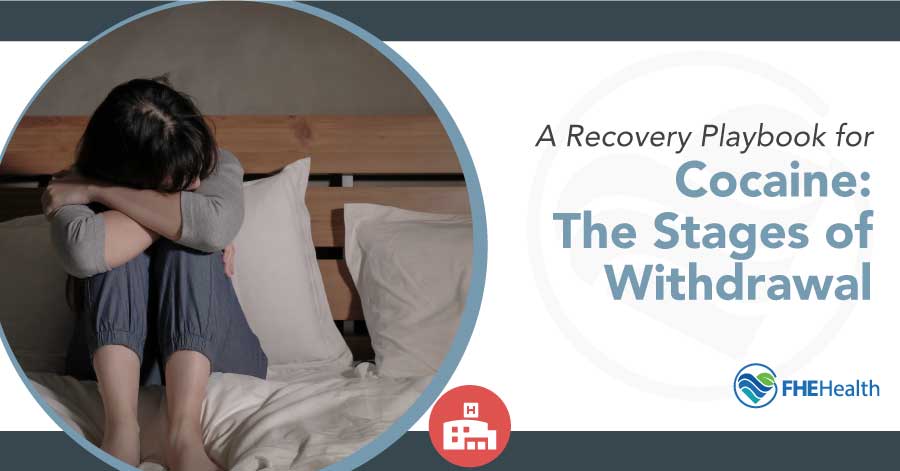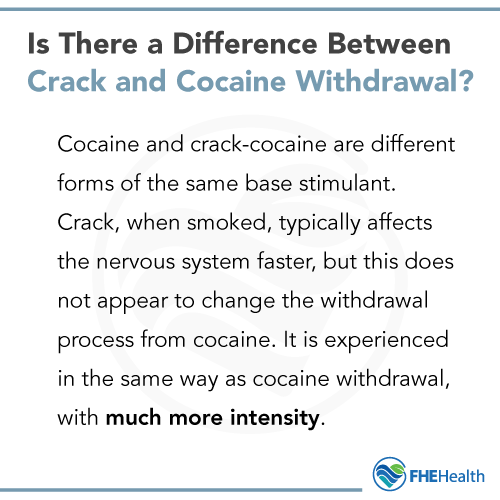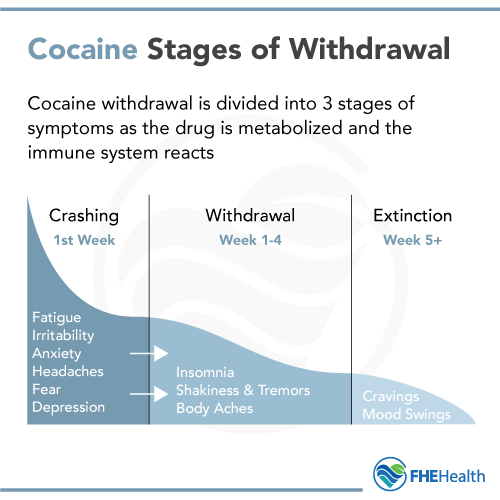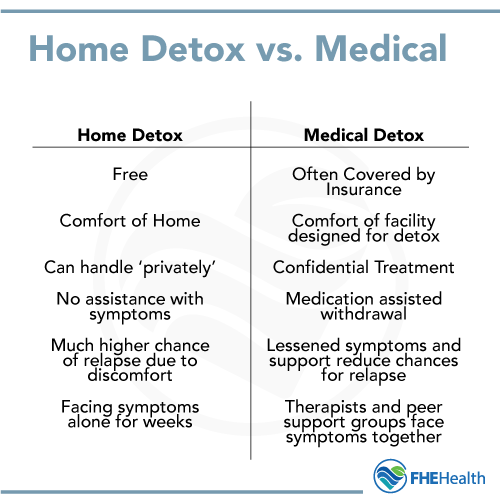
Derived from the coca plant, cocaine is a powerfully stimulating, extremely addictive drug that acts as a triple reuptake inhibitor by elevating levels of dopamine, serotonin and norepinephrine in the brain. The addictiveness of cocaine is attributed to its powerful effect on the brain’s mesolimbic reward pathway, which controls feelings of pleasure, reward and motivation. In fact, cocaine is so addictive that users experiencing withdrawal symptoms report feeling high just watching someone else inject or snort cocaine.
The Difference Between Cocaine and Crack Cocaine
 Cocaine is a white powdery substance containing cocaine-chloride, a chemical derived from the coca bush. Cocaine addicts typically snort cocaine powder after cutting it into one or more lines. Once snorted, cocaine is rapidly absorbed by capillaries leading directly into the bloodstream.
Cocaine is a white powdery substance containing cocaine-chloride, a chemical derived from the coca bush. Cocaine addicts typically snort cocaine powder after cutting it into one or more lines. Once snorted, cocaine is rapidly absorbed by capillaries leading directly into the bloodstream.
Crack cocaine is a cheaper version of cocaine. Drug dealers lace or cut the powder with baking soda, cornstarch or other white powdery substances to increase profits. Crack cocaine may also be cut with amphetamines, ammonia or procaine (a cheap anesthetic) to enhance its stimulating effects.
Users cook crack cocaine to remove hydrochloride and make it smokeable. Once cooked, crack cocaine turns into a yellowish rock-like substance that can be broken into small pieces and smoked in a pipe. The term “crack” cocaine refers to a crackling, popping noise made by crack rocks being lit and smoked.
Addicts also inject crack cocaine by crushing rocks and mixing them with water. Upon injection, crack cocaine reaches the brain in a few seconds, giving the user such an exhilarating, intense rush that it often causes injectors to vomit uncontrollably. The powerful sense of euphoria following the initial bout of nausea passes quickly, leaving the addict to immediately start craving another injection.
Physical and Psychological Effects of Cocaine and Crack Cocaine
- High blood pressure
- Dilated pupils
- Profuse sweating
- Lack of appetite
- Tachycardia
- Feelings of invincibility and fearlessness or grandiosity
- Impulsivity and lack of judgment
- Paranoia, anxiety or panic
- Muscle twitches. tremors, shaking and spasms
As tolerance to cocaine’s effects builds and users require more of the drug to get high, severe addiction sets in and starts controlling all aspects of the user’s life. Cocaine addiction has been shown to promote neuroadaptive changes in several brain systems, including the frontostriatal, a collection of neural pathways connecting the frontal lobes and basal ganglia.
Vital to mediating behavioral, cognitive and motor functioning, the frontostriatal is dependent on dopamine, serotonin and norepinephrine to work properly. Since cocaine disrupts the normal flow of these neurotransmitters, physiological changes emerge that are detrimental and ultimately destructive to the user’s psychological and physical health.
What Are the 3 Cocaine Withdrawal Stages?
1. Crashing
 Cocaine and crack cocaine addicts feel extremely alert, energetic and euphoric for about an hour or two after snorting, smoking or injecting the drug. Crashing refers to coming down off a cocaine high.
Cocaine and crack cocaine addicts feel extremely alert, energetic and euphoric for about an hour or two after snorting, smoking or injecting the drug. Crashing refers to coming down off a cocaine high.
Overwhelming fatigue, irritability, anxiety, headaches, fear and depression characterizes the “crash and burn” stage of withdrawing from cocaine. Without a hit of cocaine to flood the brain with dopamine, serotonin and norepinephrine, long-term cocaine addicts who are crashing almost never make it past this stage without giving in to their cravings for more cocaine.
2. Withdrawal
If cocaine addicts make it past the crashing stage of withdrawal, they start feeling strong withdrawal symptoms and a more intense craving for the drug. Signs of cocaine withdrawal include:
- Severe depression
- Anxiety, panic and agitation
- Body aches, chills, feverishness and sweating
- Shakiness and tremors
- Extreme fatigue or weakness
- Inability to concentrate or think clearly
- Insomnia or nightmares
Withdrawing from cocaine may take as long as a month or more depending on the severity and length of the addiction. Without professional addiction intervention, cocaine addicts usually relapse at this stage if they made it this far.
3. Extinction
Little research exists regarding the extinction or end-stage of cocaine withdrawal. Extinction may last a few weeks or take as long as a few years for some cocaine addicts. Some withdrawal symptoms continue during extinction but are not nearly as severe as symptoms indicative of the crashing or withdrawal stage.
Signs a cocaine addict is in the extinction phase include:
- Cravings continue, but less frequently and regularly. Usually, a cocaine addict experiences cravings when something triggers the craving, such as seeing someone use cocaine or encountering a drug dealer
- Moods swing and combine with feelings of boredom, loneliness and depression
Risk of relapsing varies among cocaine abusers. For some, making it to the extinction stage without relapsing means they may achieve lifetime sobriety.
Others will always have the urge to start using cocaine again. Only a medically supervised detoxification following by professional recovery support and therapy will significantly reduce the risk of relapsing in most cocaine addicts.
Are Long-Term Health Problems Caused by Cocaine Addiction Reversible?
Yes and no. Damage to the heart, intestines, brain and nasal passages may require lifelong medical attention if cocaine use is heavy and long-term.
Mental issues in areas of memory, decision-making and attention may also continue to affect users who complete an addiction program and achieve a successful recovery. This makes getting help for cocaine addiction as soon as possible essential to prevent the development of chronic health issues from undermining a recovering addict’s quality of life.
Home Detoxification vs. Medical Detoxification From Cocaine
 “Home” detoxification is simply going cold turkey without professional intervention. Physicians warn against detoxifying at home because of potentially serious health complications, such as heart arrhythmia, spiking blood pressure or extremely low blood pressure, dehydration and shock. In addition, the ability of cocaine addicts to reach the extinction phase of cocaine withdrawal without relapsing is slim to none.
“Home” detoxification is simply going cold turkey without professional intervention. Physicians warn against detoxifying at home because of potentially serious health complications, such as heart arrhythmia, spiking blood pressure or extremely low blood pressure, dehydration and shock. In addition, the ability of cocaine addicts to reach the extinction phase of cocaine withdrawal without relapsing is slim to none.
A medically supervised detoxification safely and gradually eliminates cocaine from the body while medications and counseling are provided to alleviate the severity of withdrawal symptoms. Entering a medical detox program means addicts are under the care of doctors and nurses 24/7. Staff monitors a patient’s vitals and makes sure the patient feels as comfortable as possible throughout the process of detoxifying.
To relieve cocaine withdrawal symptoms and facilitate detoxification, medications are provided to ease depression (desipramine) and muscle aches/insomnia/tremors (clonidine). Long-term cocaine addicts may experience psychotic-like symptoms requiring haloperidol, a drug that can help reduce delusional thinking or hallucinations.
Cravings for cocaine during medical detoxification are controlled with drugs that regulate the release of a neurotransmitter called GABA. By attaching to GABA receptors in the brain, this neurotransmitter calms nervous system activity and eases feelings of stress, fear and anxiety associated with drug cravings.
After completing cocaine detoxification, patients enter the next phase of recovery by working with psychologists and counselors to develop a personalized treatment plan addressing the patient’s unique psychological and physical needs.
Help Is Available for Cocaine Withdrawal
A drug rehab facility equipped with medical detox services is the best type of addiction recovery center for cocaine abusers who want to learn how to live a sober life using relapse prevention techniques, coping skills and other tools taught by experienced addiction therapists. Call FHE Health today to find out how we can put you on the path to recovery.






